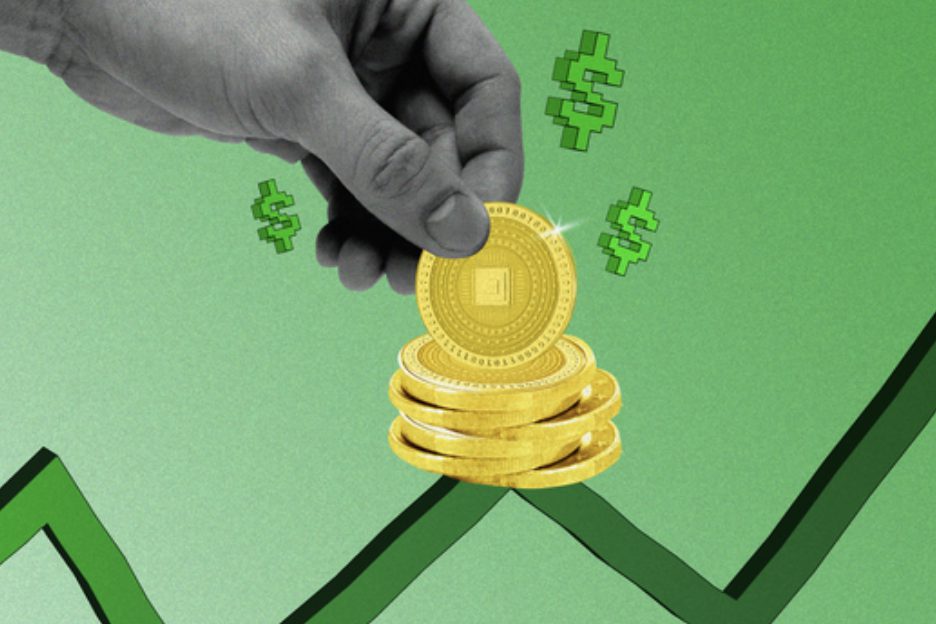How does Crypto Gain Value? : A Comprehensive Guide
Cryptocurrency, a digital asset class operating on decentralized systems, has captured the world’s attention.
Despite its volatility and unpredictability, it has proven to be a significant player in the financial scene. So, what gives cryptocurrency its value?
It’s based on supply and demand dynamics, just like any other asset class. However, several other factors also come into play. Let’s explore these various elements in detail.
Also read: How To Buy Bitcoin and Crypto With Payoneer?


Defining Cryptocurrency
A Digital Revolution Cryptocurrency represents a radical shift in how we think about and use money.
It’s a type of digital currency that uses cryptography for security, making it impossible to counterfeit.
Unlike traditional or fiat currencies (like the U.S. dollar or the Euro), a central authority or bank does not control cryptocurrencies.
Instead, they operate on blockchain technology, a decentralized system that manages and records transactions across many computers (nodes).
Bitcoin, the first and most well-known cryptocurrency, paved the way for many other digital coins, contributing to a total market capitalization exceeding $1 trillion as of 2023.
It’s essential to understand that cryptocurrencies are a high-risk, high-reward investment. As such, they should only be a part of a diversified portfolio.
Also read: BRICS: How Digital Currency Could Be Key to De-Dollarization
How does Crypto Gain Value?: Supply and Demand
The principle of supply and demand is at the heart of cryptocurrency’s valuation.
This economic model dictates that the value or price will rise if demand increases while supply remains the same.
Conversely, the value or price will fall if supply increases while demand remains the same.
In cryptocurrency, the supply mechanism is often predefined in the coin’s protocol.
For instance, Bitcoin has a fixed maximum supply of 21 million bitcoins. This scarcity factor is one of the reasons contributing to Bitcoin’s value.
On the other hand, some cryptocurrencies, like Ethereum, don’t have a maximum supply limit, which can influence their price differently.
Demand for cryptocurrency can rise due to various factors, including increased utility, positive market sentiment, regulations, etc.
For instance, a cryptocurrency that offers unique functionality or solves a significant problem can see a surge in demand.
Mining and Production Costs: The Backbone of Cryptocurrency
In the world of cryptocurrency, new tokens are generated through mining. This involves using computational power to solve complex mathematical problems, verifying transactions, and adding them to the blockchain.
This process forms the essence of a proof-of-work system used by cryptocurrencies like Bitcoin and Ethereum.
The cost of mining includes the expense of high-powered computer equipment and electricity. As more miners join the network, the difficulty of mining increases, leading to higher costs.


Consequently, the value of the cryptocurrency must rise to make mining economically viable. Hence, the cost of production plays a crucial role in determining a cryptocurrency’s value.
The Role of Cryptocurrency Exchanges
Cryptocurrency exchanges are platforms where users can buy, sell, or exchange cryptocurrencies for other digital currencies or traditional currencies like US dollars or euros.
The availability of a cryptocurrency on various exchanges can significantly impact its value.
Mainstream cryptocurrencies such as Bitcoin and Ethereum are listed on multiple exchanges, which increases accessibility and, hence, demand.
Conversely, smaller, less-known cryptocurrencies may only be available on certain exchanges or not be listed at all, limiting their potential demand.
Competition: The Battle of the Coins
Just like in any market, competition affects the value of cryptocurrencies.
With thousands of different cryptocurrencies available and new ones being launched regularly, each coin must strive to offer unique features or uses to stand out and increase demand.
For example, if a new cryptocurrency offers lower transaction fees or faster processing times than an existing one, users may switch, leading to decreased demand and value for the latter.
Therefore, a cryptocurrency’s value can often reflect its competitive standing in the market.
Governance: The Rules of the Game
The rules and protocols governing a cryptocurrency network can also influence its value. These rules, often encoded in the cryptocurrency’s software, can be changed or upgraded but usually require consensus among users, which can be a complex and contentious process.
Effective governance can enhance a cryptocurrency’s value by fostering trust and stability. However, unstable or controversial governance can lead to forks (splits in the blockchain), creating uncertainty and potentially reducing value.
For instance, Ethereum is transitioning from a proof-of-work to a proof-of-stake system, which is expected to make its network more scalable and energy-efficient.
This governance decision has been widely seen as positive, contributing to Ethereum’s value.
Regulations: The Double-Edged Sword


How does Crypto Gain Value? Another factor is regulatory developments.
Cryptocurrencies operate in a legal gray area in many jurisdictions, leading to uncertainty and risk.
Positive regulatory developments, like the legitimization of cryptocurrencies as legal tender or the approval of cryptocurrency-based financial products, can boost the value of cryptocurrencies. However, regulatory crackdowns or bans on cryptocurrencies can have the opposite effect.
Moreover, the lack of a clear regulatory framework can lead to manipulation and fraudulent practices in cryptocurrency markets, which can negatively impact the value of cryptocurrencies.
Cryptocurrency and Recessions: An Uncharted Territory
The relationship between cryptocurrency values and economic recessions is still largely uncharted due to the novelty of the asset class.
However, given that cryptocurrency values are largely driven by speculative trading, it’s possible that they could be affected by economic downturns.
When the economy is doing well and investors’ risk appetite is high, more capital will likely flow into speculative assets like cryptocurrencies.
Conversely, investors may move their capital into safer assets in economic downturns, potentially decreasing cryptocurrency values.
Conclusion: How Does Crypto Gain Value?
Cryptocurrencies are a revolutionary new form of money that has the potential to reshape the global financial landscape.
However, they are also highly volatile and speculative assets, and their values can fluctuate wildly based on supply and demand, cost of production, regulatory developments, and a range of other factors.
If you’re considering investing in cryptocurrencies, it’s important to understand these dynamics and only invest what you can afford to lose.
Cryptocurrencies can be a good investment for those with a high-risk tolerance and a long-term investment horizon, but they are unsuitable for all investors.
Remember, the world of cryptocurrencies is fast-paced and ever-changing. Staying informed and understanding the factors that drive the value of cryptocurrencies can help you navigate this exciting but often unpredictable market.





